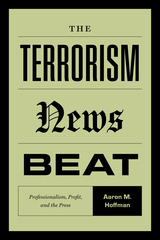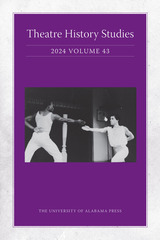15 start with G start with G

The collection is divided into four sections based on how the Lingít talk about g̱agaan—the sun. Featuring some poems in English, some in Lingít, and some that combine the beauty of the two, Gagaan Xʼusyee / Beneath the Foot of the Sun displays an equal dignity in both languages that transcends monolingual constrictions.
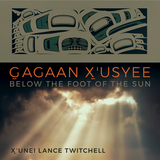
The collection is divided into four sections based on how the Lingít talk about g̱agaan—the sun. Featuring some poems in English, some in Lingít, and some that combine the beauty of the two, Gagaan Xʼusyee / Beneath the Foot of the Sun displays an equal dignity in both languages that transcends monolingual constrictions.
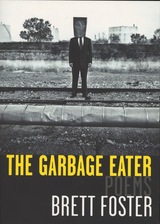
In Foster’s vivid imagination, however, they point to the surprises hidden in the quotidian: a trip to the DMV, a visit to a chain restaurant, and the saintly reflections of the Kansas City Royals’ best closer. A lesser, more faddish writer would then tend toward ironic distance, but Foster fearlessly raises such unfashionable subjects as joy, doubt, gratitude, and grief without losing a sly sense of humor, even (as the sample poem shows) about poetry itself. Given its ambition, The Garbage Eater hardly seems a debut work. Foster’s universal subject matter and approachable style will win fans among both the most experienced poetry readers and those easily intimidated by contemporary verse.
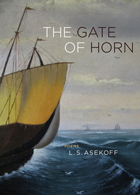
Recepient of 2013 Guggenheim Fellowship
Apart from two volumes published in the 1990s, the work of L. S. Asekoff has been winning admirers only among those lucky enough to encounter it in poetry journals and magazines over the last three decades. Now comes a new collection from this startlingly original poet. Astonishing in its variety of forms and subject matter, The Gate of Horn includes a series of monologues in which Asekoff conjures voices as disparate as the Marquis de Sade, an ancient Aztec warrior, an immigrant
Korean woman, a Vietnam vet, and a Holocaust historian. Above all, however, it is Asekoff’s own unmistakable voice that is on display— surreally sensual, intensely lyrical, darkly tragicomic. Through the gates of death and dreams, these wide-ranging, loosely associative poems speak with wit and erudition to the deepest mysteries of language and of life.
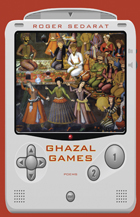
As an Iranian American poet, Roger Sedarat fuses Western and Eastern traditions to reinvent the classicalPersian form of the ghazal. For its humor as well as its spirituality, the poems in this collection can perhapsbest be described as “Wallace Stevens meets Rumi.” Perhaps most striking is the poet’s use of the ancient ghazal form in the tradition of the classical masters like Hafez and Rumi to politically challenge the Islamic Republic of Iran’s continual crackdown on protesters. Not since the late Agha Shahid Ali has a poet translated the letter as well as the spirit of this form into English, using musicality and inventive rhyme to extend the reach of the ghazal in a new language and tradition.
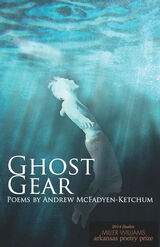
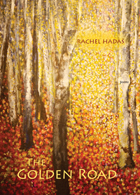
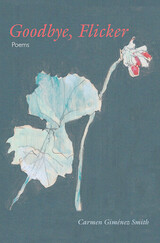
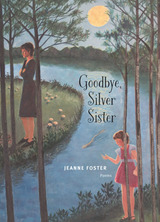
Goodbye, Silver Sister, Jeanne Foster’s second collection of poems, opens with a series of poems about a girl coming of age in pre-Katrina New Orleans, informed and haunted by the magic of the city. The powerful Pearl River forms the dividing line between adulthood and other worlds, both geographic and existential: “death, divorce, and the thousand other ways I would lose faith in the breastplate of love.”
The collection is also an elegy for and tribute to the poet’s parents, who met in the WPA Artists’ Project. Through her poems she keeps them alive and is also able to say good-bye. Like the work of her mentor, James Wright, these poems reach far beyond the personal in their willingness to look at the unseemly sides of being human within the context of a profound spiritual search.
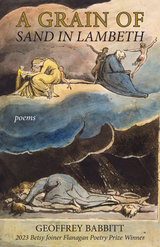
Each poem in this collection inhabits a moment of Blake’s life, offering a vivid glimpse into his unique perspective—a perspective that rejected the normative for the transformative power of imagination. From his visionary watercolors to his provocative views on oil painting, these poems draw readers into Blake’s world, where reality and the unseen converge in prismatic intensity.
A Grain of Sand in Lambeth is an invitation to experience the world through Blake’s eyes—a world where imagination reigns supreme and art is a living force.
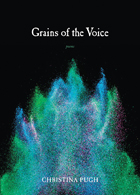
Christina Pugh’s Grains of the Voice exhibits a pervasive fascination with sound in all its manifestations. The human voice, musical instruments, the sounds produced by the natural and man-made worlds—all serve at one time or another as both the framework of poems and the occasion for their lightning-quick changes of direction, of tone, of point of reference. The poems are eclectic in their allusiveness, filled with echoes—and sometimes the words themselves—of other poets, but just as often of songs both popular and obscure, of the noise of pop culture, and of philosophers’ writings. But Pugh always wears her learning lightly. Beneath the jewellike surfaces of her poems is a strenuous investigation of the nature of and need for communication and a celebration of the endless variety of its forms.
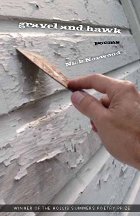
Gravel and Hawk dwells on the physical and cultural landscapes of the Texarkana border region, an area of stark natural beauty and even starker manifestations of its human habitation: oil derricks and pump jacks, logging trucks, chicken houses, come-to-Jesus billboards, and greasy catfish joints, a patchwork of dying farm towns and ragtag municipalities laced together by county roads, state highways, and that treacherous, rust-hued slurry known as the Red River. Gravel and Hawk charts the emotional landscape of a single extended family, its history of loss and gain, and, especially, its encounters with violent death. It is an eminently readable collection, rooted in a distinctly American place and united by a poetic voice that is honest, sophisticated, and persuasive.
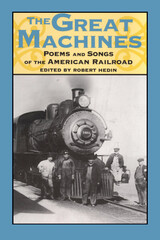
Here, for the first time, is a feast for anyone who has ever been beguiled by the trains that formerly thrummed through the landscapes of our lives. This entertaining and evocative anthology presents the amazing variety of poems and songs written about the American railroad in the last century and a half. Comprised of selections from both oral and written traditions, the volume celebrates the historical and cultural significance of this marvel of engineering skills. Hedin's anthology allows all readers, from the most avid railroad buff to anyone who has fond memories of train travel, to enjoy the romance of trains.
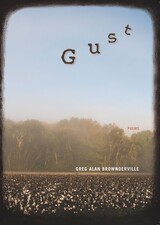
Brownderville commands the complex eloquence of Southerners who love not only local color but also high-flown rhetoric. Instead of reinforcing stereotypes about rural folks' thought and speech, he challenges our assumptions by presenting real life as a festival of mixed diction. Church, as Brownderville enacts it, both quickens and forbids the erotic, whose lightning flashes and crashes everywhere in these poems. Highlights include a press conference with a bizarrely poetic rural sheriff, a Zimbabwean meter never before employed in English, a rock and roll song interrupted by a Walmart intercom, and poems about the exploitation of Italians in Arkansas cotton fields.
At once evoking Yeats and Whitman, Gust recovers the dramatic mode often neglected in contemporary American poetry. Brownderville's uncanny lyricism storms through stories that are both moving and humorous.
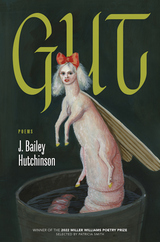
Winner, 2022 Miller Williams Poetry Prize
J. Bailey Hutchinson’s Gut is the dazzling debut of a born storyteller. In Hutchinson’s poems, which explore the substance of personal history, family attains the mysterious stature of folklore, while the vast worlds of nature and of the imagination abound with extraordinary creatures that likewise elude full understanding. For the voracious consciousness at work here, inheritance—what it means to be from a particular place and a particular people, no matter how one might strain against that—lies at the very heart of things.
READERS
Browse our collection.
PUBLISHERS
See BiblioVault's publisher services.
STUDENT SERVICES
Files for college accessibility offices.
UChicago Accessibility Resources
home | accessibility | search | about | contact us
BiblioVault ® 2001 - 2025
The University of Chicago Press



